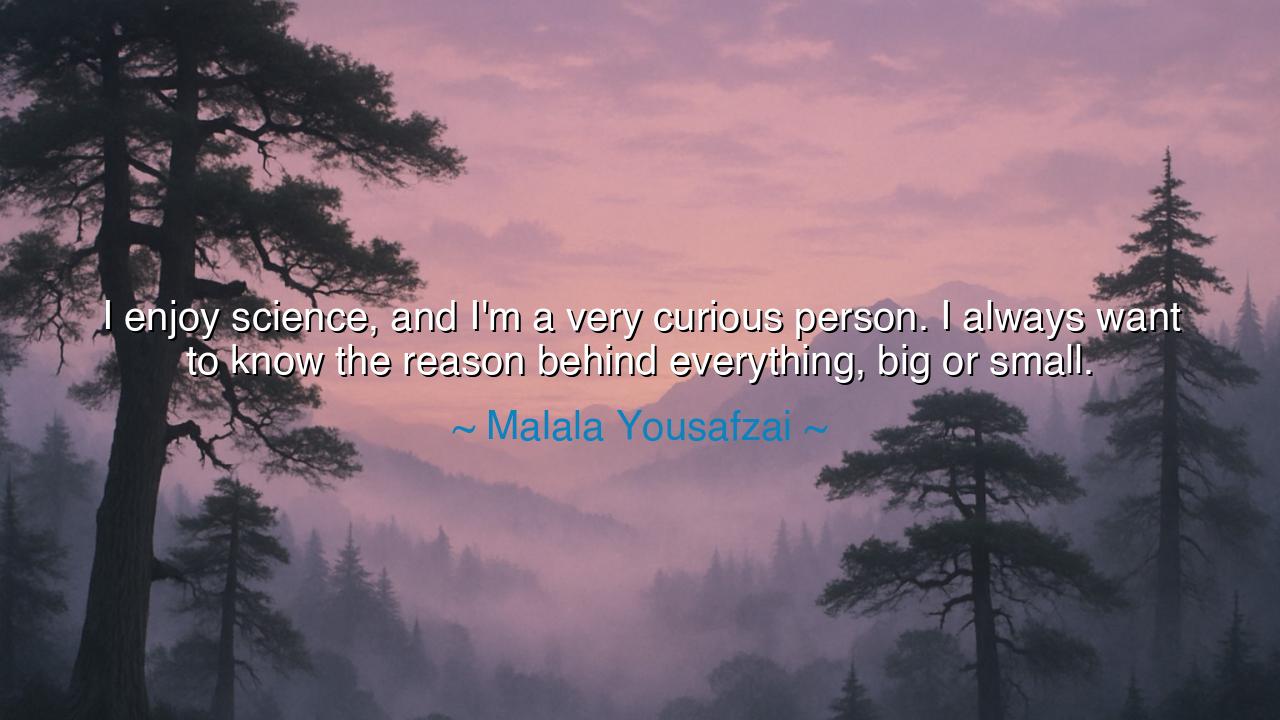
I enjoy science, and I'm a very curious person. I always want to
I enjoy science, and I'm a very curious person. I always want to know the reason behind everything, big or small.






Listen, O Seekers of Knowledge, to the words of Malala Yousafzai, whose insatiable curiosity and quest for truth remind us of the power of questioning. "I enjoy science, and I'm a very curious person. I always want to know the reason behind everything, big or small." In these words, Malala expresses a principle that has guided many of the great minds in history—the relentless pursuit of understanding. Her words echo the eternal human desire to look beyond the surface, to delve deep into the why and how of the world around us. This curiosity is not just about gathering facts; it is about uncovering the truths that govern our existence, whether they be the great forces of the universe or the smallest intricacies of human life.
Consider, O Seekers, the ancient philosophers, who were driven by this same curiosity to seek understanding of the world and the universe. Socrates, the father of philosophy, made his name by asking questions, constantly probing the foundations of truth with the words, "Know thyself." He believed that the key to wisdom lay not in knowing all things but in understanding why and how we come to know them. He sought to question every assumption, to challenge the conventional wisdom of his time, and to seek the deeper truths that others might overlook. His method, now known as the Socratic method, was based on curiosity, on the relentless questioning of what we think we know. In this, Socrates' philosophy mirrors the spirit of Malala’s words—curiosity is not simply an academic pursuit, but a way of engaging with life itself.
In the same way, Malala Yousafzai exemplifies the power of curiosity in her own journey. Growing up in a world where her voice was often silenced, Malala sought to understand not only her own circumstances but the broader world of injustice, oppression, and inequality. Curiosity drove her to question the structures of power that restricted the education of girls, and it was this same curiosity that led her to challenge those who sought to keep her and others from learning. Her quest to know—to understand the reasons behind the systems of control—became the foundation of her courage and determination to fight for education, for the right of every child to ask questions, to learn, and to grow.
Let us also look to the example of Marie Curie, whose own curiosity led her to a groundbreaking discovery in the world of science. Curie, driven by a desire to understand the mysteries of the natural world, spent years in pursuit of knowledge about radioactivity, a term she coined herself. Her work was not merely the result of intellectual pursuit, but a profound commitment to the idea that science was a means to understand the very forces of nature—forces that could ultimately benefit humanity. Much like Malala, Curie did not accept the status quo or settle for easy answers. She dug deeper, asked questions, and broke through barriers, forever changing the way we understand the physical world. Her curiosity, combined with her passion for truth, made her one of the most important figures in the history of science.
O Seekers, the lesson here is not just about learning for the sake of knowledge, but about the deep purpose that curiosity serves. Curiosity is not merely about satisfying a personal desire for answers; it is about shaping the world for the better. Just as Socrates used his questions to provoke thought and uncover deeper truths, so too did Malala use her questioning to challenge the systems that sought to silence her. Her curiosity was the fuel for her activism, and it was through her pursuit of truth that she became a voice for millions of girls who longed for the opportunity to ask, to learn, and to grow. Likewise, Marie Curie’s thirst for understanding led not just to scientific discoveries, but to a legacy of progress that changed the world.
The practical lesson, O Seekers, is that we must all cultivate a curiosity that goes beyond the surface. Whether in science, in art, or in the pursuit of justice, let questions be our guide. When we encounter challenges or injustices, let us ask, “Why?” and “How?” Let us not be content with the answers others provide, but dig deeper, search for the truths that lie beneath. Just as Malala used her curiosity to fuel her fight for education, so too must we use our own questions to fuel our pursuit of a better world. Curiosity is not merely an intellectual tool—it is the spark that drives us toward progress, toward a future in which the questions of today lead to the answers of tomorrow.
So, O Seekers, take Malala’s words to heart: be curious in all things. Ask the questions that others fear to ask, seek the answers that others overlook, and pursue the truths that lie just beyond the veil. Let your curiosity be the compass that guides you toward a life of meaning, discovery, and change. For in asking the right questions, we not only discover the world—we change it for the better. Let the quest for knowledge be a journey of both mind and spirit, one that leads you to understand the deepest mysteries of the world and to share that understanding with others.






AAdministratorAdministrator
Welcome, honored guests. Please leave a comment, we will respond soon